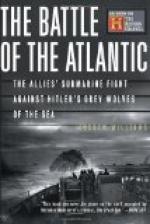happy fortune which had opened the way for me to board
the
Namur must also intervene to aid me in
solving future problems. Mine was the philosophy
of a sailor, to whom peril was but a part of life.
All I seemed to require now was a sufficiency of courage
and faith—the opportunity would be given.
In this spirit of aroused hope, I continued to stare
out into the black night, watchfully, the shrouded
deck behind me silent, and seemingly deserted, except
for the steady tramp from rail to rail of LeVere,
keeping his lonely watch aft. The crew had disappeared,
lying down no doubt in corners out of the wind.
And this wind was certainly rising, already attaining
a force to be reckoned with, for the boom of waves
hurled against the bows of the laboring bark, was steadily
becoming more noticeable, while overhead the ropes
sang dismally. I wondered that LeVere hung on
so long in his perilous position, although, in spite
of the increased strain, the anchor still clung firmly.
Quite probably he had received stern orders not to
shift from his present position until the boat returned,
yet surely his judgment as a competent seaman, left
in command, must make him aware of the threatening
danger. He would never wreck his vessel merely
because he had been instructed to remain at that particular
spot. It seemed to me that no hawser ever made
could long withstand the terrific strain of our tugging,
as the struggling bark rose and fell in the grip of
the sea. To him must have come the same conviction,
for suddenly his high-pitched voice sang out from
the poop:
“Stand by, forrard, to lower the starboard anchor;
move lively, men. Everything ready, Haines?”
“All clear, sir. Come on the jump, bullies!”
“Then let go smartly. Watch that you don’t
get the line fouled. Aloft there! Anything
in sight, Cavere?”
From high up on the fore-top yard, the answer, blown
by the wind, came down in broken English:
“Non, M’sieur; I see nottings.”
“Well, don’t go to sleep; keep both eyes
open!”
I had already joined the watch forward, aware only
of the numerous dim, and shapeless figures about me,
busily employed in straightening out the kinks in
the heavy cable. The number of men on deck was
evidence of a large crew, there being many more than
were necessary for the work to be done. Most
of them appeared to be able seamen, and Haines drove
them mercilessly, cursing them for lubbers, and twice
kicking viciously at a stooping form. There was
no talking, only the growl of an occasional oath,
the slapping of the hawser on deck, and the sharp
orders of Haines. Then the great rope began to
slip swiftly through the hawse hole, and we heard
the sharp splash as the iron flukes struck the water,
and sank. Almost at that same instant the voice
of Cavere rang out from the mast-head:
“A sail, M’sieur—a sail!”
“Where away?”
“Off ze port quarter. I make eet to be
ze leetle boat—she just round ze point”




